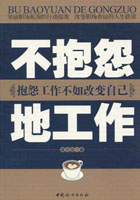The question, "How is an external mine and thine possible?" resolves itself into this other question: "How is a merely juridical or rational possession possible?" And this second question resolves itself again into a third: "How is a synthetic proposition in right possible a priori?"All propositions of right- as juridical propositions- are propositions a priori, for they are practical laws of reason (dictamina rationis).But the juridical proposition a priori respecting empirical possession is analytical; for it says nothing more than what follows by the principle of contradiction, from the conception of such possession; namely, that if I am the holder of a thing in the way of being physically connected with it, any one interfering with it without my consent- as, for instance, in wrenching an apple out of my hand- affects and detracts from my freedom as that which is internally mine; and consequently the maxim of his action is in direct contradiction to the axiom of right.The proposition expressing the principle of an empirical rightful possession does not therefore go beyond the right of a person in reference to himself.
On the other hand, the proposition expressing the possibility of the possession of a thing external to me, after abstraction of all the conditions of empirical possession in space and time- consequently presenting the assumption of the possibility of a possessio noumenon- goes beyond these limiting conditions; and because this proposition asserts a possession even without physical holding, as necessary to the conception of the external mine and thine, it is synthetical.And thus it becomes a problem for reason to show how such a proposition, extending its range beyond the conception of empirical possession, is possible a priori.
In this manner, for instance, the act of taking possession of a particular portion of the soil is a mode exercising the private free-will without being an act of usurpation.The possessor founds upon the innate right of common possession of the surface of the earth, and upon the universal will corresponding a priori to it, which allows a private possession of the soil; because what are mere things would be otherwise made in themselves and by a law into unappropriable objects.Thus a first appropriator acquires originally by primary possession a particular portion of the ground;and by right (jure) he resists every other person who would hinder him in the private use of it, although, while the "state of nature"continues, this cannot be done by juridical means (de jure), because a public law does not yet exist.
And although a piece of ground should be regarded as free, or declared to be such, so as to be for the public use of all without distinction, yet it cannot be said that it is thus free by nature and originally so, prior to any juridical act.For there would be a real relation already incorporated in such a piece of ground by the very fact that the possession of it was denied to any particular individual; and as this public freedom of the ground would be a prohibition of it to every particular individual, this presupposes a common possession of it which cannot take effect without a contract.Apiece of ground, however, which can only become publicly free by contract, must actually be in the possession of all those associated together, who mutually interdict or suspend each other, from any particular or private use of it.
This original community of the soil and of the things upon it (communio fundi originaria), is an idea which has objective and practical juridical reality and is entirely different from the idea of a primitive community of things, which is a fiction.For the latter would have had to be founded as a form of society, and must have taken its rise from a contract by which all renounced the right of private possession, so that by uniting the property owned by each into a whole, it was thus transformed into a common possession.But had such an event taken place, history must have presented some evidence of it.To regard such a procedure as the original mode of taking possession, and to hold that the particular possessions of every individual may and ought to be grounded upon it, is evidently a contradiction.
Possession (possessio) is to be distinguished from habitation as mere residence (sedes); and the act of taking possession of the soil in the intention of acquiring it once for all, is also to be distinguished from settlement or domicile (incolatus), which is a continuous private possession of a place that is dependent on the presence of the individual upon it.We have not here to deal with the question of domiciliary settlement, as that is a secondary juridical act which may follow upon possession, or may not occur at all; for as such it could not involve an original possession, but only a secondary possession derived from the consent of others.
Simple physical possession, or holding of the soil, involves already certain relations of right to the thing, although it is certainly not sufficient to enable me to regard it as mine.Relative to others, so far as they know, it appears as a first possession in harmony with the law of external freedom; and, at the same time, it is embraced in the universal original possession which contains a priori the fundamental principle of the possibility of a private possession.Hence to disturb the first occupier or holder of a portion of the soil in his use of it is a lesion or wrong done to him.The first taking of possession has therefore a title of right (titulus possessionis) in its favour, which is simply the principle of the original common possession; and the saying that "It is well for those who are in possession" (beati possidentes), when one is not bound to authenticate his possession, is a principle of natural right that establishes the juridical act of taking possession, as a ground of acquisition upon which every first possessor may found.














